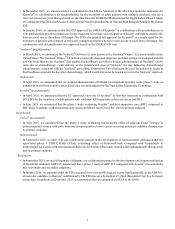Amgen 2015 Annual Report Download - page 21
Download and view the complete annual report
Please find page 21 of the 2015 Amgen annual report below. You can navigate through the pages in the report by either clicking on the pages listed below, or by using the keyword search tool below to find specific information within the annual report.13
Health authorities, including the FDA, also have the authority, before or after approval, to require companies to implement
a risk management program for a product to ensure that the benefits of the drug outweigh the risks. Each risk management program
is unique and varies depending on the specific factors required. In the United States, a risk management program is known as a
risk evaluation and mitigation strategy (REMS) and we currently have REMS for our ESAs, Prolia®, Nplate® and BLINCYTO®.
Other Regulation
We are also subject to various laws pertaining to healthcare “fraud and abuse,” including anti-kickback laws and false claims
laws. Anti-kickback laws make it illegal to solicit, offer, receive or pay any remuneration in exchange for or to induce the referral
of business, including the purchase or prescription of a particular drug that is reimbursed by a state or federal program. False
claims laws prohibit knowingly and willingly presenting, or causing to be presented for payment to third-party payers (including
Medicare and Medicaid) any claims for reimbursed drugs or services that are false or fraudulent, claims for items or services not
provided as claimed or claims for medically unnecessary items or services. Violations of fraud and abuse laws may be punishable
by criminal and/or civil sanctions, including fines and civil monetary penalties, as well as the possibility of exclusion from federal
healthcare programs (including Medicare and Medicaid). Liability under the false claims laws may also arise when a violation of
certain laws or regulations related to the underlying products (for example, violations regarding improper promotional activity or
unlawful payments) contributes to the submission of a false claim.
On December 19, 2012, Amgen announced that it had finalized a settlement agreement with the U.S. government and
various other parties regarding allegations that Amgen’s promotional, contracting, sales and marketing activities and arrangements
caused the submission of various false claims under the Federal Civil False Claims Act and various State False Claims Acts. In
connection with entering into the settlement agreement, Amgen also entered into a corporate integrity agreement with the Office
of Inspector General (OIG) of the U.S. Department of Health and Human Services that requires Amgen to maintain its corporate
compliance program and to undertake a set of defined corporate integrity obligations for a period of five years. Due to the breadth
of the statutory provisions and the absence of guidance in the form of regulations or court decisions addressing some of our
practices, it is possible that in the future our practices might be further challenged under anti-kickback or similar laws.
Additionally, the U.S. Foreign Corrupt Practices Act (FCPA) prohibits U.S. corporations and their representatives from
offering, promising, authorizing or making payments to any foreign government official, government staff member, political party
or political candidate in an attempt to obtain or retain business abroad. The scope of the FCPA includes interactions with certain
healthcare professionals in many countries. Other countries have enacted similar anti-corruption laws and/or regulations.
Our business has been and will continue to be subject to various other U.S. and foreign laws, rules and/or regulations.
























